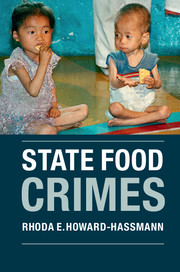Book contents
- Frontmatter
- Dedication
- Contents
- Acknowledgments
- Part I Introduction and Background
- Part II Contemporary Case Studies
- Part III Implications for the International Human Right to Food
- 8 International Law and the Right to Food
- 9 Sticks and Carrots: Sanctions and Food Aid
- 10 Interdependent Human Rights
- 11 Liberal Democracies and the Right to Food
- 12 A New International Treaty on the Right to Food
- Bibliography
- Index
9 - Sticks and Carrots: Sanctions and Food Aid
from Part III - Implications for the International Human Right to Food
Published online by Cambridge University Press: 05 August 2016
- Frontmatter
- Dedication
- Contents
- Acknowledgments
- Part I Introduction and Background
- Part II Contemporary Case Studies
- Part III Implications for the International Human Right to Food
- 8 International Law and the Right to Food
- 9 Sticks and Carrots: Sanctions and Food Aid
- 10 Interdependent Human Rights
- 11 Liberal Democracies and the Right to Food
- 12 A New International Treaty on the Right to Food
- Bibliography
- Index
Summary
States frequently try to persuade or coerce each other to change their behavior toward their citizens or accept outside intervention for humanitarian reasons. States’ actions can include positive measures such as diplomatic engagement and foreign aid, or negative measures such as moral condemnation, sanctions, and – in the last instance – military force. Since 2000 an international consensus has been evolving that states are obliged to protect citizens of other states when they suffer extreme violations of their human rights.
In 2001 the Canadian government sponsored the International Commission on Intervention and State Sovereignty. This Commission concluded that there were sometimes just causes for military intervention against a sovereign state, and advocated a responsibility to protect, colloquially known as R2P. The threshold for such intervention was “serious and irreparable harm,” defined as large-scale loss of life or large-scale ethnic cleansing, whether or not with genocidal intent, as the product of deliberate state action, state neglect, or state failure. Like the Rome Statute of the International Criminal Court, however, the Commission's report did not identify state-induced famine as a specific crime (International Commission on Intervention and State Sovereignty 2001, xii).
In 2005 a report by Kofi Annan, then Secretary-General of the United Nations, discussed whether states had the right, or even the obligation, to use force “to rescue the citizens of other States from genocide or comparable crimes” (Annan 2005, par. 122, p. 33). In 2006 the United Nations Security Council (UNSC) adopted a resolution on R2P, but most of its clauses referred to the responsibility of a state to protect its own people. Only clause 26 referred to the UN's own responsibility, noting that “the deliberate targeting of civilians and other protected persons, and the commission of systematic, flagrant and widespread violations of international humanitarian and human rights law in situations of armed conflict, may constitute a threat to international peace and security,” and reaffirming the readiness of the UNSC “to consider such situations and, where necessary, to adopt appropriate steps” (United Nations Security Council 2006, April 28). Actual armed intervention was still, however, a last step, not to be taken lightly. Moreover, the UNSC Resolution referred only to situations of armed conflict, not to criminal behavior by states.
- Type
- Chapter
- Information
- State Food Crimes , pp. 156 - 179Publisher: Cambridge University PressPrint publication year: 2016



